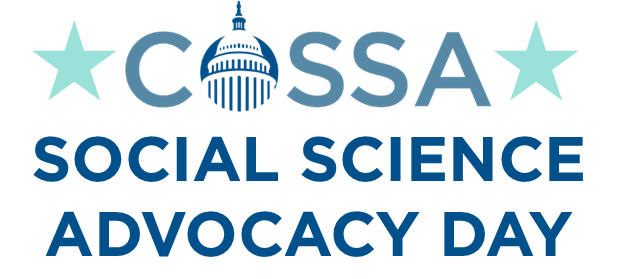
2015 COSSA Annual Meeting & Social and Behavioral Science Advocacy Day
March 9, 2015-March 10, 2015
COSSA held its 2015 Annual Meeting & Social and Behavioral Science Advocacy Day on March 9 and 10, 2015. The meeting brought together more than 100 members of the social and behavioral science community for a day of discussion on federal issues impacting social and behavioral science research. The following day, more than 60 people took to Capitol Hill for Social and Behavioral Science Advocacy Day to meet with their Congressional delegations to discuss the value and importance of this research.
Thanks to all who attended! We hope to see you back next year!
Snapshots from the Meeting
Social, Behavioral, and Economic Science at the National Science Foundation
National Science Foundation (NSF) Director France Córdova spoke to participants about social, behavioral, and economic (SBE) science at NSF. She observed that 2015 marks the 70th anniversary of Vannevar Bush’s landmark report, Science the Endless Frontier, which became the foundation for NSF’s creation. In that report, Bush famously argued, “It would be folly to set up a program under which research in the natural sciences and medicine was expanded at the cost of the social sciences, humanities, and other studies so essential to national well-being.”Córdova echoed that sentiment and spoke fondly of her experience as an undergraduate conducting research into the sociology of bilingualism in Oaxaca, Mexico.
Turning back to her tenure as NSF director, Córdova highlighted the cross-directorate initiatives proposed in the President’s budget request: Understanding the Brain; Innovations at the Nexus of Food, Energy, and Water Systems (INFEWS); Risk and Resilience; and Inclusion across the Nation of Communities of Learners that have been Underrepresented for Diversity in Engineering and Science (INCLUDES). Each of these initiatives includes the SBE sciences as a key component. She also discussed NSF’s new transparency and accountability measures, which she hopes will help communicate the value of the research NSF funds, and expressed a desire to hear from the science community on how to best highlight the important work NSF supports, social and behavioral science in particular.
Behavioral and Social Science Research at the National Institutes of Health
Substituting for National Institutes of Health (NIH) director Francis Collins, acting director for the Office of Behavioral and Social Sciences Research (OBSSR), William (Bill) Riley, provided COSSA meeting attendees with an overview of the NIH’s activities and investments in the behavioral and social sciences. Riley shared a video in which Collins expressed his regret at not being able to join the meeting in person and acknowledged the role of these sciences in NIH-supported research. He also noted the NIH’s Science of Behavior Change (SOBC) program funded through the agency’s Common Fund (see Update, January 27, 2015). Highlighting the recently introduced Precision Medicine Initiative (PMI) announced in the President’s FY 2016 budget request, Collins stated that the initiative is a “golden opportunity” for social and behavioral science research because a main focus of the PMI will be how to “better keep people healthy, how to influence their decision making in ways that have better outcomes.”
Collins expects the PMI to also be a great platform for mHealth (mobile health) technologies on a scale that allows us to discern if they actually work. OBSSR has been centrally involved in the activities associated with mHealth, he explained, adding that while we have a lot of apps, there are not a lot of good evidence-based approaches to demonstrate whether the apps are improving health outcomes. Precision medicine, Collins stated, provides the opportunity to do that kind of testing. Collins stressed that “the NIH is deeply invested and committed to supporting research in social and behavioral science.” The NIH understands how important it is to be able to derive the rigorous research that allows us to begin to make some inroads into those 40 percent of people in hospitals because of behavioral choices. We need to understand what drives that and how to influence those decisions. Recognizing that social science tends to be “an easy whipping boy” for those in the media and some political forces, Collins emphasized that he did not want the community to think such views reflect how the NIH feels about the social and behavioral science research.
Riley highlighted several of the grants referenced by Collins where research had been mischaracterized. He explained that those mischaracterizing the research had access only to publicly available grant titles and abstracts, were unlikely to have expertise in that area, and filtered their decisions regarding worthiness for funding through a predetermined narrative. The NIH’s review process on the other hand consists of (1) a first-level review by a panel of experts in the specific research area who read the entire grant application, discuss the application with the full panel, score the application on significance, approach, innovation, environment, and investigators, and provide a detailed summary of their review; (2) programmatic evaluation for consistency, institute priorities, and portfolio balance, among other factors; (3) second-level review by an advisory council; and (4) decision to fund only about 14 percent of all proposals submitted to the NIH.
Riley also discussed OBSSR’s support of mHealth research and the need for a continuum of mHealth tools in the areas of measurement, diagnostic, treatment, and global needs; the Precision Medicine Initiative, social determinants of health, research understanding the relationship between years of education and longevity; and dissemination and implementation studies. He concluded his remarks by announcing the activities planned for OBSSR’s 20th anniversary celebration, including the June 23 Matilda White Riley Lecture featuring Jeanne Brooks-Gunn and Kelvin Volpp, a June 24 panel discussion on training and careers, and the June 25 day-long celebration of the behavioral and social sciences on the NIH campus.
Defending Sound Science: When Politics and Peer Review Collide
The meeting’s final panel, “Defending Sound Science: When Politics and Peer Review Collide,” focused on what happens when researchers’ work falls under the scrutiny of Congress, the media, or both. The discussion was chaired by Edward Liebow, Executive Director of the American Anthropological Association.
The first three panelists spoke from personal experience of having their research unflatteringly caricatured. David Scholnick, professor of biology at Pacific University, had his research into the physiological impacts of pollution and warming oceans on marine life receive national attention after his video of a “shrimp on a treadmill” went viral. Scholnick tried to take advantage of his newfound notoriety to bring positive attention to his research, but was frustrated by the experience and concerned about the impact on the many undergraduate researchers who worked in his lab.
Megan Tracy, assistant professor of sociology at James Madison University, found out her research on the food safety regulation system in China had been called into question during a 2013 House Science Committee hearing when she was contacted by a reporter for comment (the grant was also included on the list of grants Chairman Lamar Smith requested extensive information on from NSF). She was up for tenure at the time and was concerned that the scrutiny would hurt her chances. In addition, Tracy noted that the sheer amount of time she had to spend responding to the attention was a distraction from her research.
Filippo Menczer, professor of informatics and computer science at Indiana University, saw his “Truthy project” research into the spread of misinformation on social media mischaracterized by the conservative media as an attempt to limit free speech. Noting the irony of the situation, Menczer attempted to correct the misinformation about his research in interviews and by putting up a website, but ultimately was not able to prevent the mischaracterization of his work. Inspired by his experiences, he has begun work on automated fact-checking, although he expressed skepticism that it would do much good in a world where the media is increasingly polarized.
The final speaker, Joanna Kempner, an assistant professor of sociology at Rutgers University, shared the findings from research she conducted on the lasting impacts of controversy on scientists. Kempner’s work focused on the grants targeted by then-Representative Pat Toomey and a “family values” group in 2003, most of which were looking at sexuality or HIV. Kempner found that the unwanted attention was actually motivating for some researchers, reinforcing their commitment to the work they were doing. However, for others, it led to self-censorship; researchers chose to seek grants on less controversial topics or to reframe their work to leave out easily politicized buzzwords.
Slides:
- “NIH and the Behavioral and Social Sciences,” William Riley, Office of Behavioral and Social Sciences Research, National Institutes of Health
- “NOAA, Society, and the Economy,” David Yoskowitz, National Oceanic and Atmospheric Administration
- “How Do Scientists React to Controversy?” Joanna Kempner, Rutgers University
- Advocacy Day Training, Christopher Kush, Soapbox Consulting
View a message from NIH Director Francis Collins
Thank you to our sponsors!








